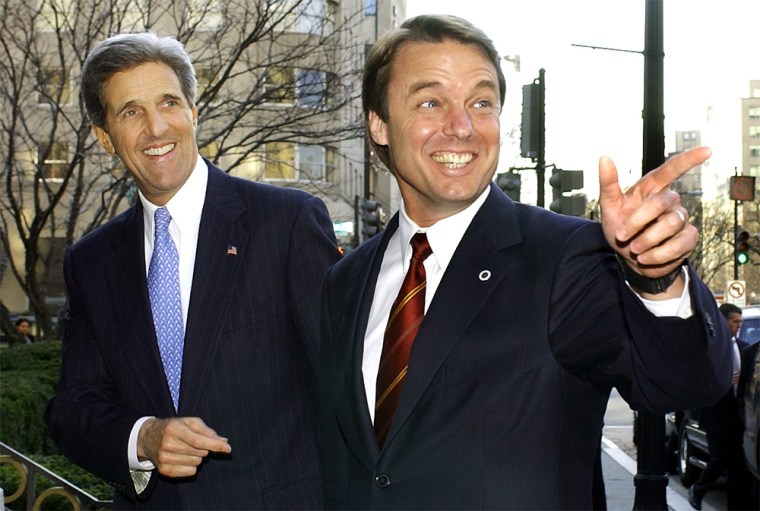John Edwards offers boyish good looks and a trial lawyer’s verbal skills. Kathleen Sebelius is a heartland governor whose gender is another factor. And William Cohen provides political balance: He’s a Republican.
They’re part of a talented field talked up as entries in the John Kerry running-mate sweepstakes, each with something to bring to the Democratic presidential ticket. Although many Democrats want Kerry to name a running mate soon, their presumptive nominee doesn’t appear to be in any hurry.
Kerry’s selection process is unlikely to yield a decision for weeks. There are no firm assurances he will announce his selection before the nominating convention in late July, even though that’s the goal.
Once Kerry settles on a short list of candidates, each will undergo intense scrutiny to try to prevent any surprises. The campaign has yet to determine what needs should be addressed in the selection, delaying the process even more.
“I don’t think they’ve clearly made up their minds about which direction to go,” said veteran consultant Steve Jarding.
Some of the caution stems from the fact that the decision is Kerry’s biggest since locking up the nomination.
Congressional and other Democrats have urged Kerry to move quickly. House Minority Leader Nancy Pelosi, D-Calif., told reporters Friday that he should pick a vice presidential candidate by May 1.
But those most familiar with the campaign’s thinking see mid-May as the earliest potential date for an announcement, and few would be surprised if the decision doesn’t come until June.
“There’s pressure to do it early, but there’s pressure to do it right,” said Jarding.
Heading Kerry’s selection process is Jim Johnson, a former chief executive officer for the mortgage lender Fannie Mae and a Democratic operative since he was a top aide to Vice President Walter Mondale. The selection process is kept within a tight circle.
“It’s not something we have to think about,” said senior adviser Michael Meehan, who said most campaign staffers are focusing on the rapidly growing Kerry campaign.
Decisions on a running mate are made after careful political calculation. Al Gore, for instance, sought to distance himself from President Clinton’s sex scandal by picking Connecticut Sen. Joe Lieberman, a vociferous critic of Clinton’s behavior.
Cheney: The consummate insider
George W. Bush, facing nagging doubts about his national and international experience, chose Dick Cheney, a veteran Washington insider. Cheney, a former congressman, was defense secretary under Bush’s father.
Still being debated is whether Kerry most needs regional, ideologic, or ethnic balance for the ticket. Kerry refuses to discuss the issue and has made it clear he frowns on advisers who speak about it publicly, leaving many to talk only on condition of anonymity.
With the race for the White House tight, and with President Bush’s campaign already aggressively challenging Kerry, a quick decision could bolster fund raising and provide a prominent voice to counter Bush.
Potential running mates most often mentioned by Democrats interviewed by The Associated Press are:
- North Carolina Sen. John Edwards. Kerry’s final major rival in the primary race is mentioned by virtually all after a relentlessly upbeat campaign that impressed many. Working against him is the difficulty of making an argument for change with two senators on the ticket. Edwards told reporters last week, “I don’t think we ought to prejudge” a decision by Kerry.
- Bob Kerrey. The former Nebraska governor and senator is, like Kerry, a decorated Vietnam War veteran. Though he has impressed many with his work on the independent commission investigating the Sept. 11 attacks, Kerrey has said he’s not interested in joining the ticket. Retired Gen. Wesley Clark would also burnish the ticket’s military credentials.
- Kansas Gov. Kathleen Sebelius. Adding gender balance to the list, she also is a moderate elected in a Republican state and could offer Kerry a bridge to groups like the Democratic Leadership Council.
- William Cohen. The Maine Republican served in the Senate, then as defense secretary under Clinton. His selection could be seen as a bold stroke and a nod toward bipartisanship.
- Virginia Gov. Mark Warner. A fresh face after winning election in 2001, Warner could help in important Southern states. Like all governors, he has struggled with budget problems, and his plan to close the deficit relies partially on tax increases.
- New Mexico Gov. Bill Richardson. He would bring a Hispanic flavor and a nod to the nation’s largest and fastest-growing minority. A former U.N. ambassador, Richardson also would provide foreign policy experience.
- Iowa Gov. Tom Vilsack. He is in the middle of his second term in a state that narrowly went Democratic in 2000. He has pledged not to seek a third term and has left little doubt about his interest in higher office.
- Rep. Dick Gephardt. The longtime Missouri congressman saw his bid for the nomination fade early, but he maintains strong ties to organized labor. There is pressure on his behalf.
